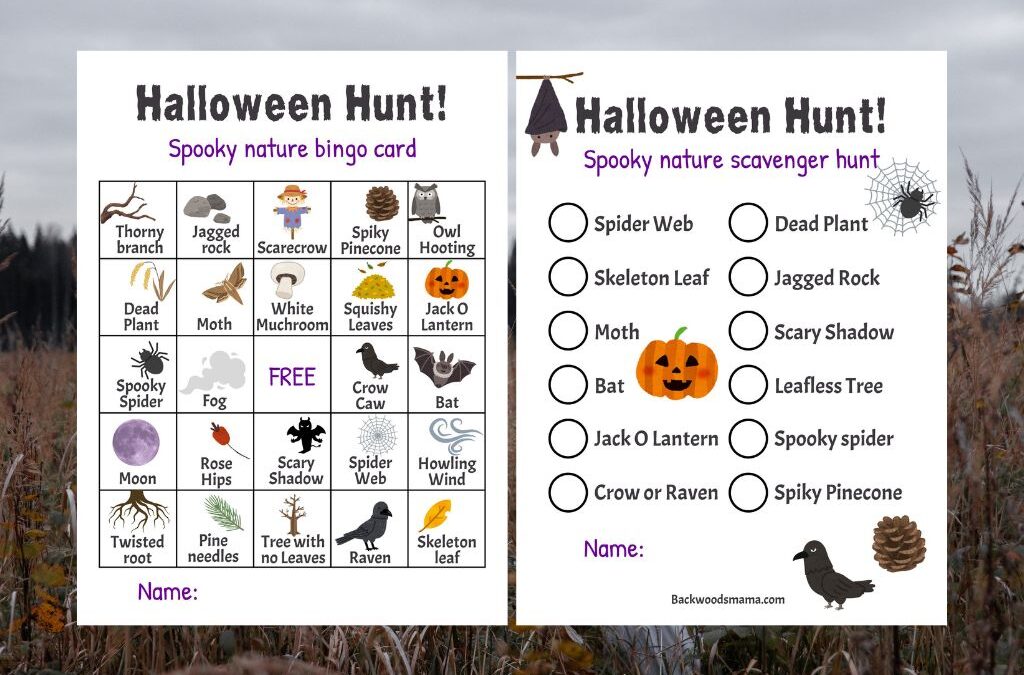×

Halloween Nature Scavenger Hunt & Bingo (Free Printables!)
Halloween is here, along with all the spooky, magical things happening in nature as fall deepens. Spiders creep into cozy corners, webs glisten...

When my firstborn came into the world I was paranoid about dirt and germs. I was the mom that sterilized everything: soothers, teethers, toys, board books… You name it and I probably sterilized it. When my baby started to move around keeping him and his environment clean became rather challenging. I worried when I discovered him playing in the toilet and panicked when he took an interest in smearing his poop all over everything. He was constantly drawn to puddles, sand, dirt and mud, often shoving handfuls of dirt into his mouth the moment I turned around. It stressed me out and made me anxious. I wish I would have known then what I know now!
Children should be outside often and should be allowed to be barefoot and to get dirty, and handwashing does not necessarily need to immediately follow these activities. – Let Them Eat Dirt: How Microbes Can Make Your Child Healthier
Kids need to get dirty to be both healthy and happy. This might seem counterintuitive in our culture, but more and more research is showing this to be true. It’s important to understand, however, that not all dirt is created equal. Playing outside in the mud, grass and dirt is very different than playing in an indoor space. Here’s a helpful tip from the book Let Them Eat Dirt:
When children are out walking or playing in a green space […] the risk of getting infected with microbes that carry human diseases decreases drastically. Allow your kids to touch anything they want (except animal waste), including dirt, mud, trees, plants, insects, etc. […] Let them stay dirty for as long as the play session lasts or until it’s time to eat.1
Dirt is filled with all sorts of healthy microbes, and when kids are exposed to them it strengthens their immune systems which helps to prevent chronic conditions like asthma, allergies, diabetes and obesity.
My oldest child, the one I tried so hard to keep clean and sanitized as a baby, ended up developing both asthma and allergies. While there could be a genetic link to his conditions, I can’t help but wonder my obsession with cleanliness contributed, especially since my two younger children don’t have asthma or allergies (I was more relaxed about dirt with my younger two).
When kids spend time outside they are less stressed, anxious and depressed. In fact, within minutes of being outside around nature kids start feeling relaxed.2
Whenever I hear giggles and boisterous laughs coming from our yard I can be fairly confident that mud and dirt are involved. My kids love digging holes and covering themselves head to toe in mud.
Outdoor play, with all it’s dirt and mud, keeps kids moving. It’s been shown that kids run, climb and jump outside much more than they do inside, even compared to indoor sports.3 All this movement helps kids maintain a healthier body weight which prevent chronic health issues like diabetes.
As kids spend more and more time indoors, sensory processing issues are sky rocketing. Many children are developing over or undersensitive senses and while genetics is a factor so is the lack of free outdoor play. When kids go outside all of their senses are stimulated. There’s so much for them to see, touch, smell and hear outdoors which helps their brain grow and make connections.4 Letting kids walk barefoot through the woods, scoop up mud with their hands and roll down a grassy hill are not only fun but helps them develop a healthy sensory system.
Kids that play outside and get dirty are better at solving problems and are more creative too. Time outside not only improves children’s memory, concentration and attention span it also helps them develop emotional and social intelligence.5 6
My kids love building sand castles and as they years go by their castles are becoming more elaborate. Even building a simple sand castle takes a lot of planning, creativity and problem solving.
Most kids don’t need much encouragement to get dirty, but if you and your child need a bit of help here are fifteen fun activities to try.
Download the FREE PDF – Let Your Kids Get Dirty: 15 Fun Activities.
Teaching kids to wash their hands is a very important because it helps them avoid getting sick. Get your kids to wash their hands with plain soap and water:
Kids do not need to wash their hands after playing outside! (unless they’re about to eat).
These tips were taken from Let Them Eat Dirt Q&A.
Let Them Eat Dirt: How Microbes Can Make Your Child Healthier by
Disclaimer: This page contains Amazon Affiliates links and I may earn a small commission from your purchases made through them.
0 Comments